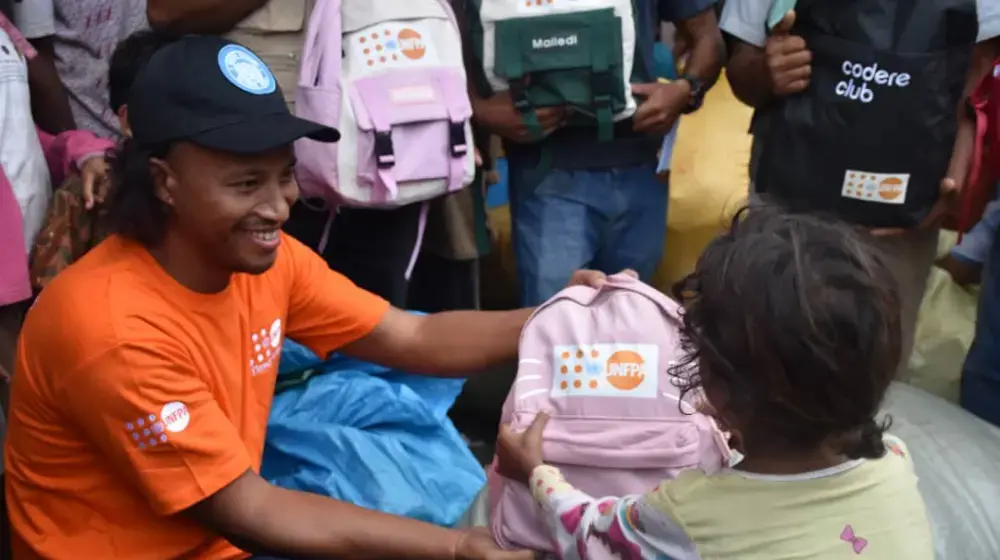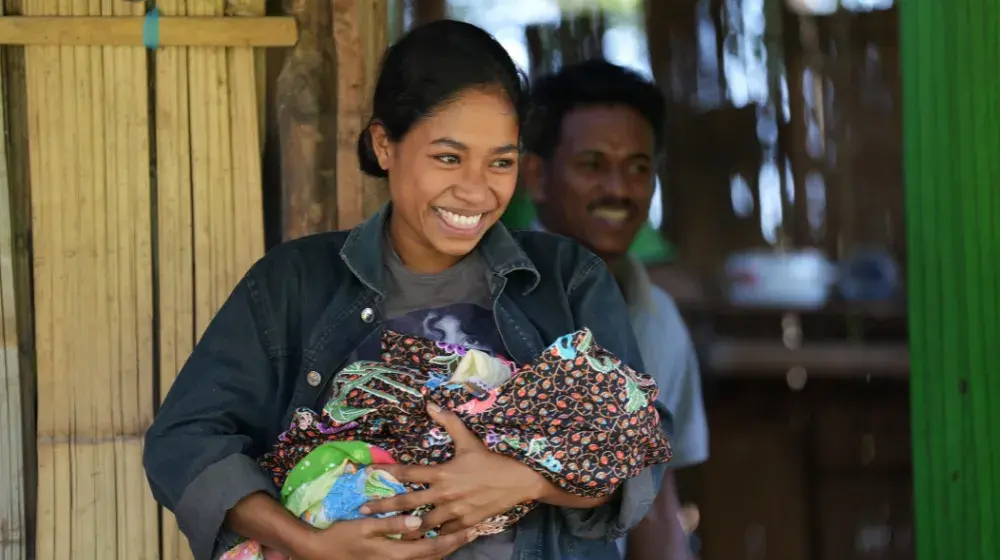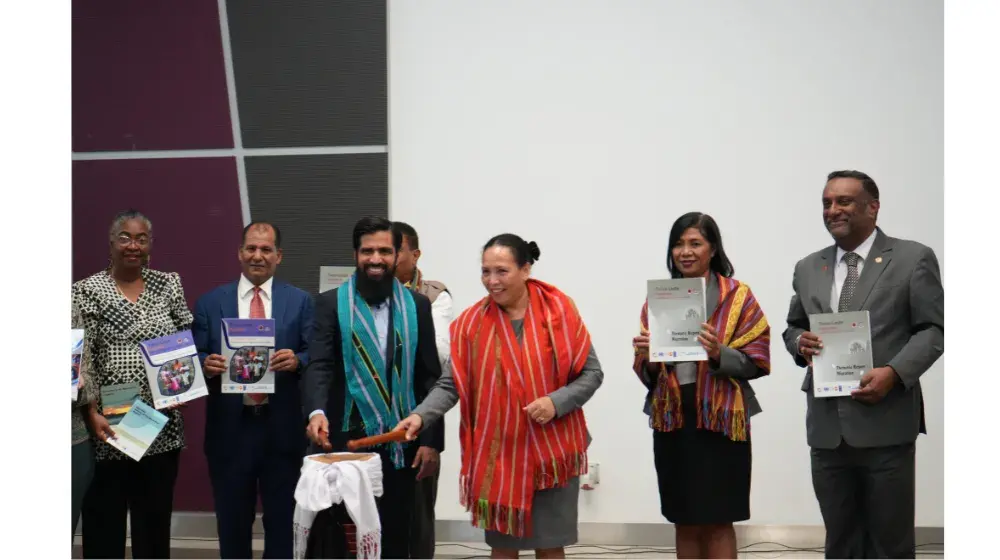MENSAJEM BA LORON MUNDIAL POPULASAUN
Dr. Babatunde Osotimehin
Secretariu Jeral Nasoens Unidas no Direitor Ezekutivu UNFPA
11 Julhu 2015
Relatoriu resente ida husi Nasoens Unidas alerta katak numeru refuziadus sira aumenta ba numeru ema - kuaze milaun 60 iha fim de 2014. Entre sira nee, feto no labarik feto barak enfrenta ameasas sira nebe rezulta husi ausensia ba saude no servisu esensial seluk nebe sira presija.
Maske iha kondisaun normal nian, komplikasaun saude reproduktiva sai hanesan kauza ba mate no moras entre feto sira iha idade reproduktiva. Iha situasaun humanitaria, estimasaun feto 1 husi feto 5 no labarik feto sira sei isin rua. Laiha parteira nebe treinadu no kuidadus emerjensia obstetrika, risku ba mate no moras ba feto isin rua no labarik feto sira sai aas liu tan.
Feto no labarik feto sira mos enfrenta risku nebe aas ba abuzu, exploitasaun seksual, violensia no kaben obriga durante konflitu no dizastre naturais. Alende nee, feto barak nebe moris hafoin krizi sai chefe de familia, ho responsabilidade prinsipal fo kuidadus ba sira nia oan. Sira mos dalabarak presija rezolve obstaklus boot atu fornese saude no kuidadus ba sira nia oan, ema sira nebe moras, sira nebe kanek no ferik/katuas sira, no hola responsabilidade ba asistensia no rekonstrusaun. Ho buat sira nee hotu, sira dalaruma bele la preokupa ho sira ninia nesesidade rasik tamba sira preokupa liu ho ema seluk.
Situasaun emerjensia komplexu nebe ita responde dadaun nee inklui konflitu nebe la hotu, sai aat liu tan ho estadu nebe failha, konsekuensia husi mudansa klimatika, no involvementu grupu extremista sira nebe reklama teritoriu, rekursus no poder.
Ho ida nee tema ba Loron Mundial Populasaun ba tinan ida ne'e "Populasaun vulnerabel iha Situasaun Emerjensia" ho intensaun atu sublinha nesesidade spesial ba feto no labarik feto sira durante konflitu no dizastre humarnitariu.
Prioridade ida husi prioridade sira UNFPA, Fundus Nasoens Unidas ba Populasaun, mak atu hakbiit no salva guarda bem-estar feto sira, labarik feto sira, no jovem sira no responde ba sira nia nesesidade spesifiku no problemas. Ami servisu hamutuk ho governu, sistema Nasoens unidas, parseiru lokal sira no sira seluk iha area preparasaun dizastre atu garantia saude reproduktiva integra iha situasaun emerjensia hotu.
UNFPA organiza kit ijiene sira, fornese obsetritika no kontraseptivu, pesoal nebe treinadu no suporta sira seluk ba populasaun nebe vulnerabel. UNFPA mos servisu atu garantia no responde ba nesesidade husi feto sira, labarik feto sira no jovem sira durante situasaun emerjensia no faze rekonstrusaun. Ami nia meta mak atu garantia proteksaun direitu ba seksual no saude reproduktiva feto no labarik sira no garantia sira nia seguransa.
Iha Loron Mundial Populasaun ohin nian, ami apela ba komunidade internasional sira atu dupla ou aumenta sira ninia esforsu atu proteje saude no direitu feto no jovem sira. Ita presija hakbiit feto sira, labarik feto sira no jovem sira atu uza sira nia papel bainhira koalia kona ba paz, dezenvolvimentu paz no rekuperasaun, no atu garantia katak governu halo tuir lei internasional no lori perpetrador husi violensia domestika ba justisa. Liu husi tau prioridade ba saude, direitu no partisipasaun maximu husi feto, labarik feto sira no jovem sira iha moris publiku, ita hasae ita nia hanoin nebe justu, estavel no iha mundu nebe iha paz.
***
MESSAGE FOR WORLD POPULATION DAY
Dr. Babatunde Osotimehin
United Nations Under-Secretary-General and UNFPA Executive Director
11 July 2015
A recent United Nations report warns that the number of forcibly displaced people has risen to a record number - almost 60 million at the end of 2014. Among these, most women and adolescent girls face particular threats as a result of the absence of health and other essential services that they need.
Even under normal conditions, reproductive health complications are a leading cause of death and illnessamong women of childbearing age. In humanitarian situations, an estimated one in five women and adolescent girls are likely to be pregnant. As skilled birth attendance and emergency obstetric care often become unavailable, pregnant women's and girls' vulnerability to death and injury is further exacerbated.
Women and adolescent girls also face much greater risk of abuse, sexual exploitation, violence and forced marriage during conflicts and natural disasters. In addition, many women who survive a crisis become heads of household, with the sole responsibility of caring for their children. They often have to overcome immense obstacles to provide health and care for children, the sick, the injured and the elderly, and bear the heaviest burden of relief and reconstruction. As a result, they may neglect their own needs as they care for others.
The complex emergencies we are responding to include protracted conflicts, made worse by poor or failed governance, the consequences of climate change, and the engagement of extremist groups claiming territory, resources and power.
That is why the theme of this World Population Day, "Vulnerable Populations in Emergencies", is intended to highlight the special needs of women and adolescent girls during conflicts and humanitarian disasters.
One of the priorities of UNFPA, the United Nations Population Fund, is to empower and safeguard the well-being of women, adolescent girls, and young people and address their specific needs and concerns. We work closely with governments, the United Nations system, local partners and others on disaster preparedness to ensure that reproductive health is integrated into emergency responses.
UNFPA deploys hygiene kits, obstetric and contraceptive supplies, trained personnel and other support to vulnerable populations. It also works to ensure the needs of women, adolescent girls and young people are served through both an emergency and the reconstruction phase. Our aim is to ensure that women's and adolescent girls' right to sexual and reproductive health is protected and their safety is ensured.
On this World Population Day, we call on the international community to redouble efforts to protect the health and rights of women and girls. We must enable women, adolescent girls and young people to play their full role in peace talks, peace building and recovery, and to ensure that governments comply with international law and bring perpetrators of sexual violence to justice. By prioritizing health, rights and the full participation of women, adolescent girls and young people in public life, we increase our prospects for a more just, stable and peaceful world.




